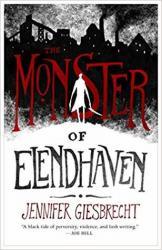
The Monster of Elendhaven follows two characters – Johann, the eponymous monster, and Florian, a mage that ultimately forces him to do his bidding. Mages are forbidden to exist in Elendhaven, and the locals in power kill Florian’s family, so Florian is out for revenge. And he’ll use Johann to ensure he gets it.
It’s rare that I wish a book was longer, but that’s definitely the case here. The worldbuilding was spectacular, as was the prose, but the plot was pretty basic, and the end jarring. I could have spent much longer in this dark, twisted world with our dark, twisted characters. I kept thinking of Patrick Suskind’s book, Perfume: A Story of a Murderer, as both of our characters were somewhat similar to the protagonist of that book. There’s a romance that I wouldn’t have minded so much, but again, it wasn’t given time to breathe in this short little novel.
TLDR: This book is nasty in that deliciously evil sort of way. If that’s your thing, you’ll love it. I wish it were a bit longer.
3.5 stars. Thanks to NetGalley and Tor for the eARC, which I received in exchange for an unbiased review.
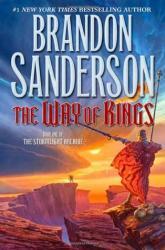
The highlight of The Way of Kings is assuredly the masterful world building. Sanderson manages to craft a fantastical and believable world with unique quirks and mountains of lore. With an exciting narrative to boot, this book (over a thousand pages long) tends to threaten other menial activities such as sleep. Though occasionally losing momentum through its frequent shift of character viewpoints, The Way of Kings is definitely a worthwhile read with compelling characters and gripping action.
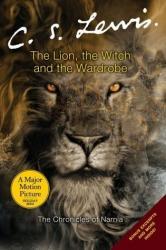
I listened to this on CD. The narrator was fantastic. The book was also fantastic. Well written, aimed at younger readers, but still enjoyable by adults. There's a reason why this book is a classic. The story had me thinking about bravery and forgiveness, but the Edmund story line was a bit frustrating. His siblings were kinder than I would've been, although I have to remember that he was just a child. All in all, a must-read, or listen.
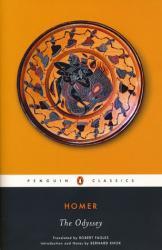
The Odyssey is an epic poem written by Homer, and it is a literary classic about two great quests. Ten years after the fall of Troy, Odysseus still hasn't returned home to Ithaca, and his house is plagued with suitors wanting to marry his wife, Penelope. His son, Telemachus, feels overwhelmed but is sure that Odysseus isn't dead. With the help of the goddess Athena, he sets off to search for his father as the reader learns more about Odysseus's previous journey and resulting enslavement. Telemachus encounters many obstacles which shape him and build his confidence by the end of the story.
Although this book is a classic and was probably very popular in ancient Greece, it is not an enjoyable book to read. There is too much unnecessary dialogue, and the plot is excessively long. Due to the old language and lengthy descriptions, reading The Odyssey is a very strenuous task.
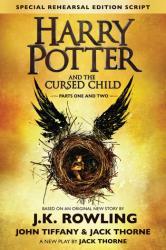
To all readers wondering what happens after Harry leaves Hogwarts, Harry Potter and the Cursed Child gives an interesting take on the idea. This is a play script, written by J.K. Rowling, Jack Thorne, and John Tiffany. It is about Harry's son, Albus--who is sorted into Slytherin--and his best friend, Scorpius Malfoy. In an effort to bring back someone from Harry's past, they travel through time and make some major mistakes--even bringing back the darkness that Harry vanquished. This book is about the bond between friends and family. Although it is creative and definitely makes an effort to continue the Harry Potter legacy, the story seemed forced the plot wasn't enjoyable.
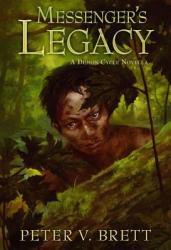
In a series that’s full of exposition and backstory, I found it a little odd that these extraneous details weren’t relegated to side-story novellas so the plot of the main series of books could focus on the current action. What’s even more curious is that Messenger’s Legacy, a side-story novella in this series, doesn’t explore anything new or interesting that hadn’t already been covered in the main books. The only new information I learned in this novella was slightly more detail about bog and swamp demons, which seems unnecessary with all things considered.
Following somewhat minor characters from The Warded Man (who haven’t appeared in the series since), Messenger’s Legacy shows it is easier to survive in demon-infested nights than the series initially indicated. While I’m not sure if any of these details will come into play in the main-line books, it does help expand the world-building just a little bit more than if this story hadn’t been included at all. As always, the demon-infused action is exciting and a strength of the author’s writing.
I’m sure there are much more interesting backstories and side-stories to tell in this series, so it’s curious that this one was written about at all. I’d much rather read about the original Deliverer or the society that crumbled away in the desert (leaving behind powerful wards in the process). Sure, there’s some personality explored in this story that helps pull the reader back to less god-like individuals and their struggles against the demons. However, with so many more interesting stories to tell, I’d suggest that anyone reading this series can skip this novella and not miss anything important.
A curious side-story that doesn’t add anything to the series, I give Messenger’s Legacy 2.5 stars out of 5.
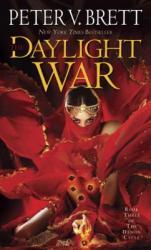
I’m glad to see that it only took two books for Peter V. Brett to cut down on some of the extraneous flashbacks and exposition in the Demon Cycle series. While whole chunks of The Warded Man could have been cut with nothing significant lost in the process, and The Desert Spear had what appeared to be an unrelated storyline that weaved through the narrative, The Daylight War has a minimal amount of this “fluff.” Granted, there is still some amount of world-building that helped to explain yet another aspect of this setting, but it’s minimal in comparison to its predecessors.
Additionally, I already knew this series was an adult fantasy from my experience with The Warded Man and The Desert Spear. These are tame when compared to the third entry in the series. The sex in this book made the previous two look like nuns in comparison. Sure, it could be argued that it “adds to the plot” in a few spots, but I’m just used to it at this point. At any rate, the differences between the two different cultures hearken back to the European and Middle-eastern cultures that undoubtedly influenced them, which also would explain the adult nature of these books.
As for the plot, the first two books seemed to set up the far superior plot in this book. While The Warded Man followed one deliverer’s path, and The Desert Spear explored an equally-gifted deliverer from a different culture, The Daylight War revealed how similar—and how different—these two men are. I don’t know if I liked the “mindreading” aspect of these individuals’ new power, as it seemed a little like lazy writing at times, but the addition of the warded skills to take on a severe threat from the demons was entertaining as always.
An adult fantasy that has finally cut a lot of the fluff of its predecessors, I give The Daylight War 4.0 stars out of 5.
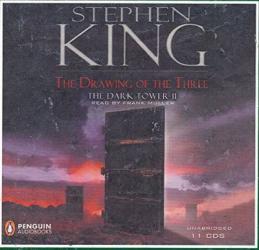
While it took me a while to get used to The Gunslinger , I was able to dive right in with The Drawing of the Three as I continue reading this Dark Tower series. Personally, I think the simplicity of the story and the immediacy of the danger helped to hook me from the start. Unlike the first book in the series, The Drawing of the Three has a solid set of relatable characters that are introduced just fast enough to get used to their unique personal challenges. If anything, these individuals piqued my interest, and I’m curious to see where their story goes from here.
One aspect of this book I found to be extremely entertaining was the action sequences. When there were stakes on the line, and things had to happen, the resulting action in these plot-moving points was both intense and hilarious. Generally, I am not much of a fan of the “fish out of water” approach to characters, but King makes it work here with The Gunslinger traveling back and forth between the worlds to take advantage of our modern wonders that help him survive in the fantastical world of the Dark Tower.
I also have to give kudos to the narrator of this work, Frank Muller, as his voice acting brought every character to vibrant life via their accents and verbal tics. I had no doubt who was speaking as he wove the story through his reading. Although, the one qualm I had with this book was that one of the characters was a bit grating on the nerves. While this added some excellent conflict to the story, it was annoying having to hear their manic voice for as long as I had to. I’m just glad that they weren’t the first character pulled into the Gunslinger’s world. Otherwise, I don’t know how I could have kept listening.
A superior and straightforward story in the Dark Tower series, I give The Drawing of the Three 4.5 stars out of 5.
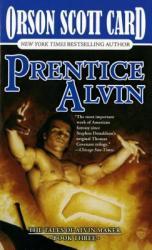
As I’ve been reading through the Tales of Alvin Maker series, I have found it interesting to see what big societal issues have been covered so far. While Seventh Son tackled religion and Red Prophet delved into politics and war, Prentice Alvin bit off a big chunk of racism and tried to address it in a way that’s half fantasy and half historical fiction. Sure, there’s still some semblance of the religion content present in this book that informs the racism dialogue. Still, these large issues end up taking a back seat to the more fascinating aspects of the titular character learning how to control his incredible powers.
In fact, this might be my favorite book of the series so far. It’s always more entertaining to watch a character come into the depth of their abilities, and Prentice Alvin has this in spades (both metaphorically and literally). While there weren’t many instances of Alvin directly being affected by a conflict that would require him to grow as a character, there were enough inevitable plot points that made me wonder how he would handle the situation. These twists helped to enforce the world-building that Orson Scott Card has excelled at for some time.
Perhaps the reason why I like this book as compared to its two predecessors comes down to how it focused more on the “magic” of this alternate history and less on the similarities to the American historical context. I’ve never been much of a fan of historical fiction, but I do appreciate explaining the events of the past through the lens of magical realism or fantasy. It’s likely why I’ll keep reading this series for the time being. At the very least, I’m curious how Alvin will grow from here, as he’s developed into a strong character who can basically do anything he wants.
A magical take on addressing the racism of America’s past, I give Prentice Alvin 4.5 stars out of 5.
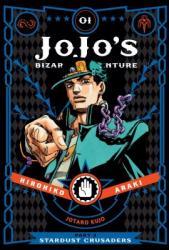
The continuation of Jojo's Bizarre Adventure brings back old characters with a fresh take and introduces us to new characters that make Jotaro's group feel rounded. It is definitely different, but 100% recommend it.
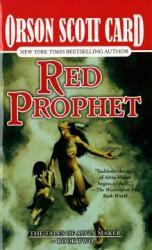
Continuing from the previous book in the Alvin Maker series, Red Prophet flashes back and shows certain events from a different point of view before driving forward into some fascinating alternate history. I continue to enjoy the fantastical elements brought into American history, even to the point of explaining how certain famous historical figures were the way they were. Although, if you know enough history, you’ll realize the fates of some of the characters presented in Red Prophet (William Henry Harrison, for instance) might not need the foreshadowing missing from this text.
While Seventh Son managed to set up this alternate history and establish some of its rules, Red Prophet delves into the action and excitement that comes from some of the more “kinetic” talents of these characters. Once the plot catches up with where Seventh Son left off, I was hooked. The interactions between Alvin and the Native Americans were quite interesting, and I found everything up until the climactic battle to be top-notch storytelling. Sure, it took a little while to get there, having to first set up the eponymous “Red Prophet” and his powers of observation, but it was worth it in the end.
My one qualm with this book lies in some of its more peculiar metaphor, allegory, and allusion. Near the end of the book, several scenes and sections feel entirely disjointed from the narrative. Perhaps they were to serve some “higher purpose” to lay out the moral of the story—or even the series as a whole. These scenes had characters who suddenly were ripped out of their normal behavior and put into a completely different context. And for what? To show that the history of the Native Americans is rich and varied while also infused with war and darkness? There had to be some other way to convey this than the way it was done here.
An action-packed follow-on to Seventh Son that gets a little too “heady” at times, I give Red Prophet 4.0 stars out of 5.
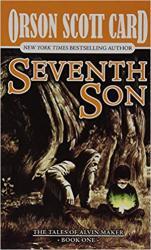
Having loved Orson Scott Card's Ender Saga, I decided to start into another of his series, Tales of Alvin Maker. I was used to his science fiction writing, so I thought it would be interesting to see how he handled semi-historical fiction. For the first book in a series, Seventh Son certainly has its strengths and weaknesses. It’s clear this book came on the heels of the Ender Saga, as there are a lot of parallels between characters and motifs that I just couldn’t ignore. Not that that’s necessarily a bad thing by any means.
While the history of colonial America is the setting of Seventh Son, the fantasy elements added to it made for an interesting read. I did appreciate the distinctive “good vs. evil” conflict between the Makers and the Unmaker, even if it’s a little too tried and true. At the very least, while the religious characters had some amount of strawman characterization set against them, they were well rounded enough not to make the whole story seem too anti-Christian. They weren’t necessarily the enemies, but their ignorance factored into the enemy’s tactics.
Perhaps the little snippets of American history sprinkled throughout this book were what intrigued me the most. Sure, the superstition and “magic” involved in creating an alternate timeline of history made quite a bit of sense. However, without at least a cursory knowledge of these events and historical figures, then readers could potentially miss a lot of substance. As with the Ender Saga, Card uses his writing to dive into different theologies and philosophies that do more than merely entertain. The fact that books like this can be thought-provoking through solid characters is a testament to his talent as a writer.
An adequate start to a series with plenty of potential, I give Seventh Son 4.0 stars out of 5.
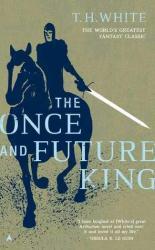
The Once and Future King, by T. H. White, is a great fantasy classic that is a retelling of the saga of King Arthur. The novel is stuffed with a mix of wonderful emotions that blend together to make a very unique fantasy story. The characters are all developed very well, especially the protagonist, and the plot fits them very well. The book has some very sorrowful scenes, but does a fantastic job of spacing them out with its humor. The only downside to the book is that it is for high-level readers.
If the story was put into a bit simpler language, it would relate to more people and reduce the amount of strain placed on the readers' mind while trying to interpret it. Overall, The Once and Future King is a great fantasy novel, but its use of complicated language takes away from the world it creates.
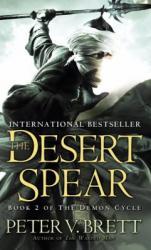
The second book in the Demon Cycle series, The Desert Spear practically proves my point that its predecessor, The Warded Man , started in the wrong place. In fact, if there weren’t an awesome battle sequence at the end of The Warded Man, I’d suggest just skipping to The Desert Spear since all the key moments from the first book were referenced in this sequel. That being said, this book has some of its own issues, some of which are gripes I continue to have about this series—which makes me think this is just the way these books are going to be.
Before I get too far down the criticism hole, I do want to say that I truly enjoy the magic system in these books. The Desert Spear doesn’t necessarily do anything new with it, but there’s at least a little more world building that happens in terms of the demons that I would have liked to see integrated more fully into the story. I like the idea of wards essentially being “computer programs” in a fantasy space, which is probably why I’ll continue to read this series. I’ll also say that the depth of the cultures presented in this book are top-notch and the action is expertly-described.
All this being said, there’s a lot of fluff in this book. The entire first third was practically a prologue to the meeting of the “desert” forces and the “forest” people, most of which could have easily been condensed. Even what I thought was a side story seemed to be only added as a way to integrate a short piece of essential plot near the end of the book. Despite being wordy, these moments were slightly necessary. Additionally, the “modern” sensibilities of Leesha are admirable for a woman in a fantasy setting but most of the time just pulled me out of the story because they didn’t necessarily match the timeframe where it was set.
A book that continues with great world building but in far too many words, I give The Desert Spear 3.5 stars out of 5.
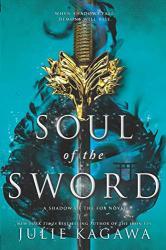
Soul of the Sword picks up directly at the end of the events of the first book in the series, Shadow of the Fox. If you haven’t read Shadow of the Fox, and you like Japanese mythology, what are you waiting for? Pick it up now! Also, skip this review, because spoilers.
If you liked the first book, you’ll like this one too. I did not remember the first book that well as I read it last summer, but Kagawa writes this in such a way that it’s easy for the reader to jump right back in. Most of our characters (save Tatsumi, because he’s mostly a demon now) get further development, and Yumeko in particular really seems to have grown a lot throughout the course of the book. My favorite character, the ronin Okame, has an exceptionally fun development. The worldbuilding, which was fantastic in the first book, continues to be alluring as Kagawa further fleshes out what was already a well-drawn world. The plot, like the first book, is fast-paced and while this is definitely something of a bridge book, it’s a bridge book that is really fun to read.
Readers of Rick Riordan who are looking for something a little more grown-up, or folks who like their fantasy to be steeped in mythology, you won’t go wrong with this series. I’m excited for the next one to come out. 4 stars – I really liked it!
Thanks to Harlequin Teen & Netgalley for the advance copy which I received in exchange for an unbiased review. Soul of the Sword will be available for purchase on 18 June or you can put your copy on hold today!
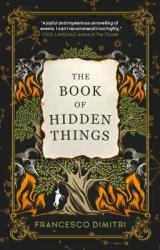
'The Book of Hidden Things' is a fantasy story of 4 friends Tony, Fabio, Art, and Mauro. These friends from a small town Casalfranca in Italy, make a pact to meet every year. When Art doesn't show up this year, Tony, Fabio, and Mauro decide to check what happened to him.
While they search for him, they learn mysterious information about Art, his life, his research, and things become more complicated and confusing. When Mauro gets fired by Art's ex-girlfriend, they all step back thinking about the risk they are taking to find Art. At last, Art shows up, reveals information about his research and forces them to trust him and take an important decision with their lives.
There are no words to explain how good this book is! The narration is very gripping and the mystery lingers till the end of the book and even after finishing the book. Characterization is simply superb. While Art is a unique character, Tony is a wonderful mate, Mauro, a responsible husband and friend who is guilty of leaving behind his favorite hobby of playing guitar and Fabio is a person with his insecurities and money problems.
I could get a glimpse of Southern Italy, the weather, the scenery, and the cuisine as well through this book. The book cover and the name are apt.
If you love mystery and fantasy, you will like this book. But, fantasy and mystery feel very real.
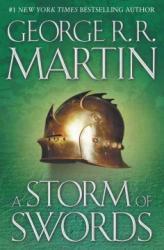
If things hadn’t already turned dark in Westeros, they certainly do in A Storm of Swords. The complicated political situation in the end of A Clash of Kings gets even more complicated as this third book dives into complex armies, weddings, wars, and so much more. George R. R. Martin’s writing may be dense, but I have never encountered a fantastical world as deeply developed as his. A Storm of Swords is jam-packed with intrigue and excitement, and it left me wanting more. I would recommend this book even if you have already seen the show; reading the books adds a whole new dimension to the characters, the plot, and the world.
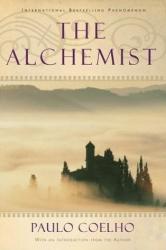
The Alchemist is the story of Santiago, a shepherd boy, who goes on a journey to find treasure he saw in a dream. It is a story of philosophy and self-discovery, and its open-ended style leaves a lot of room for interpretation. That is the beauty of this book; every reader will get something different out of it. I found The Alchemist to be very inspirational and calming, as well as immensely interesting. This quick read is great food for the soul.
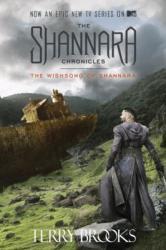
One thing that was made clear to me when I read The Elfstones of Shannara was that this trilogy (that started with The Sword of Shannara ) didn’t follow the same characters from book to book, per se. Sure, there were character like Allanon the Druid who managed to span all three volumes, but overall I didn’t find that I needed to have read the previous book in the trilogy to understand what was going on in the story. This was quite beneficial when I started reading The Wishsong of Shannara, as it quickly grew to be my favorite in the series so far.
While I had high hopes for the “main quest” of this book, the fact that it’s put into side-story status almost from the beginning was a little frustrating. Don’t make me follow the journey of the character who needs to grow the most! Show me the thrilling adventures of a magical girl and her Highlander and druid escorts. Regardless, I did find Jair’s journey to be a bit more interesting once it was clear that’s who we were following through the majority of the book. Sure, we touched back with Brin occasionally, and her adventures were neat, too—just not nearly as interesting as Jair’s ended up being.
I have previously complained that The Sword of Shannara seemed like a bit of a Lord of the Rings knockoff. Additionally, The Wishsong of Shannara does have some similarities to The Two Towers. Not necessarily being tied to an overarching story arc did help to make this book quite interesting in terms of what minor characters could be developed to advance the story. This is on top of the excellent growth of both Ohmsfords as they learn the true power of the magic that lies within them. If you’re interested in any of the original Shannara books, I’d suggest you give this one a read first.
A relatively original high fantasy, and my favorite of the Shannara trilogy, I give The Wishsong of Shannara 4.5 stars out of 5.
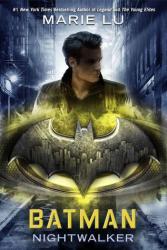
In "Batman: Nightwalker", the early years of Bruce Wayne is retold in the style of a YA novel. Years after the death of his parents, Bruce struggles with loss, a sense of purpose, and the empire he has just inherited. When a string of mysterious crimes pop up in Gotham City, he soon gets tangled in the web.
First off, when I started this book, I didn't actually know much about the Batman universe, but it was easy to catch up -- especially considering it takes places years before Bruce's story actually begins as Batman. However, I have read Marie Lu's work before, so I had a general idea of what I was getting into. There are quite a few things I liked about this book: the plot was intricate and engaging, the protagonist was likable and interesting, and the twists and turns were really well executed. But, what kept me from giving this book five stars was the writing style. Normally, I really enjoy Marie Lu's writing style, but this book was different than her other work. The dialogue often felt really unnatural (especially when it came to Bruce and his friends). There were lots of lines that I thought were cheesy or robotic and that pulled me out of the story. Had the writing flowed a little more and the dialogue been more natural, I would've definitely given this book five stars. But, I would still recommend it because, despite the flaws, I really enjoyed it for its elaborate, high-paced plot.



 Ruth Holley Library will be temporarily closed for approximately one week starting Mon., Dec. 2 to complete roof repairs.
Ruth Holley Library will be temporarily closed for approximately one week starting Mon., Dec. 2 to complete roof repairs.